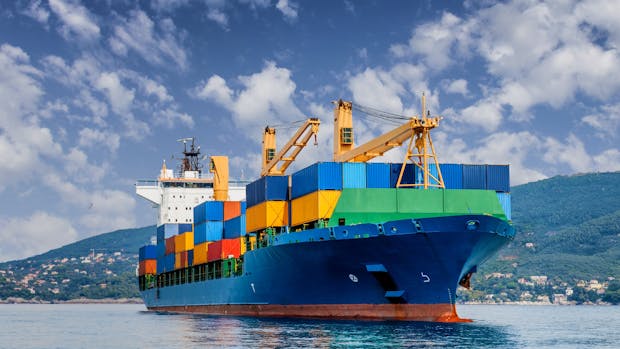FIATA brings together high-level panellists to tackle maritime crisis with solutions

Geneva, 31 May 2022 - FIATA, the International Federation of Freight Forwarders Associations, was pleased to host an impressive line-up of government advisors and decision makers representing four global regions on a high-level panel entitled “Moving Forward: What are the Solutions to the Maritime Crisis” on 20 May 2022. Together, they examined how governments in China, Europe, Africa and the US are addressing disruptions and market structural issues in the maritime supply chain.
The panel featured in the final session of a three-part webinar series on market structure and maritime competition organised by FIATA and the Global Supply Chain Classroom (GSCC). It was the concluding highlight event of the annual FIATA HQ Meeting 2022 in Geneva, Switzerland.
The session brought together:
- Dr Raïssa-Julie Ada Allogo, Senior Policy Transport Officer, Infrastructure and Energy Department, African Union Commission
- Commissioner Rebecca F. Dye, Federal Maritime Commission, USA
- Mr Henrik Mørch, Director for Transport, Post and other services, Directorate-General for Competition, European Commission
- Dr Wang Wei, Director General, Institute of Market Economy, Development Research Centre of the State Council, China
- Dr Allogo of the African Union highlighted that not a single African port finds itself in the Top 10 global ports, and that more needs to be done to change this. She commented that Africa as a region is not on the same level of discussion and requires support with capacity building. She thanked the session audience, stating that this FIATA Meeting has been a platform to get involved with the global dialogue. The African Union continue to work with the EU on support, and to mitigate key trade disruptions. Ms Allogo concluded saying that digitalisation is desperately needed, and that more collaboration is always welcome.
- Ms Dye noted the importance of multi-stakeholder dialogue in the logistics sector, and that freight rates and demurrage and detention charges were top concerns. There is also a need for service contracts to have mutually binding commitments. She called for more information transparency, more to be published online, a new commitment to focus on supply chain concerns, and she encouraged all countries to join the U.S. in this effort. The FMC has been conducting a review of competition and market concentration in the ocean shipping industry, with a report to be released soon. It is finding that concentration appears to be especially high in the US-Europe trade, but less so in the Asia-US trade lane. The FMC is also stepping up enforcement of its new detention and demurrage rules, and looking into carrier practices that favour carrier haulage over merchant arranged haulage for inland delivery.
- Mr Mørch stated that the European Commission was open to exploring whether they could build a case on dominance (as opposed to violations of competition law), focusing on individual shipping companies. The European Commission will be reviewing the carriers’ block exemption from antitrust enforcement “to see whether the basic premise of the exemption still applies.” He echoed Ms Dye, saying that even if there is increased concentration in the market, with alliances etc, there is still competition in the market - there is no ‘Google’ (single dominant player) in shipping. He commented that the European Commission needs a minimum amount of information as a basis to investigate carriers further.
- Dr Wang shared that China’s Shanghai Shipping Exchange has been monitoring rate increases that in some cases exceed the value of goods being exported by Chinese small and medium-sized enterprises. It is consulting with the carriers and encouraging increases in both ocean and rail capacity. Steps are also being taken to improve information sharing and cooperation between exporters and shipping lines. By encouraging supply, increasing capacity, investing in digital, and supervising pricing, the Chinese government is taking steps to improve and facilitate trade.
The speakers agreed that they had not yet seen evidence of any outright price fixing or illegal collusion by the shipping lines. However, they are closely monitoring the effects of market concentration and the tactics used by ocean carriers to expand into inland logistics services such as trucking, terminal operations, freight forwarding, customs brokerage, last mile delivery and air freight.
FIATA Senior Vice President and Working Group Sea Chair Jens Roemer commented 'I am satisfied that demurrage and detention as well as carriers haulage practices have been mentioned to be kept in view from the regulatory side, simply because I consider them often to be unfair. Whilst we may not always have the same opinion, we must continue to have regular dialogues with all stakeholders of the maritime supply chain. At the end of the day, all stakeholders must work towards a common goal: to improve the maritime supply chain in the interest of our customers.'
FIATA calls upon policy advisors and regulators to take into account the dramatic changes in the maritime supply chain and world trade that have been triggered over the past two years by the global pandemic, and to consider how government policy must change in response.
About FIATA
FIATA International Federation of Freight Forwarders Associations is a non-governmental, membership-based organisation representing freight forwarders in some 150 countries. FIATA’s membership is composed of 111 Association Members and more than 5,500 Individual Members, overall representing an industry of 40,000 freight forwarding and logistics firms worldwide. Based in Geneva, FIATA is ‘the global voice of freight logistics’. www.fiata.org
Media Contact
Amanda Stock
Communications Officer
Tel: +41 22 715 45 53
[email protected]